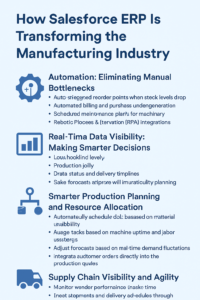
Introduction: A New Era for Manufacturers
In today’s competitive global marketplace, manufacturers are under constant pressure to enhance efficiency, reduce waste, and meet increasing customer demands. This is where Salesforce ERP for Manufacturing comes into play. By combining the robust flexibility of Salesforce’s CRM capabilities with the power of ERP functionalities, manufacturers can now access a cloud-based, unified system that streamlines operations from the shop floor to the executive office.
Let’s explore how Salesforce ERP is revolutionizing manufacturing operations, specifically through automation, real-time data visibility, production planning, and supply chain management.
1. Automation: Eliminating Manual Bottlenecks
Automation is one of the cornerstones of modern manufacturing, and Salesforce ERP takes it to the next level. Manual processes—whether in procurement, inventory control, or invoicing—are prone to errors and inefficiencies. Salesforce ERP automates these workflows to eliminate redundancy and save valuable time.
Benefits of Automation with Salesforce ERP:
- Auto-triggered reorder points when stock levels drop
- Automated billing and purchase order generation
- Scheduled maintenance alerts for machinery
- Robotic Process Automation (RPA) integrations
When combined with Salesforce’s existing tools, manufacturers can link automation to customer demand, enabling agile, just-in-time production cycles. This creates a smooth flow from sales orders to product delivery—no more delays due to missed communications or data entry errors.
👉 Learn how automation can transform your manufacturing operation with this Salesforce ERP for Manufacturing solution.
2. Real-Time Data Visibility: Making Smarter Decisions
Access to real-time data is essential for any manufacturing business that wants to stay competitive. With traditional ERP systems, reports are often delayed, siloed, or hard to interpret. Salesforce ERP for Manufacturing solves this by providing a centralized dashboard that updates in real time across departments.
From production managers to procurement leads, everyone can see:
- Live inventory levels
- Production KPIs
- Order status and delivery timelines
- Sales forecasts aligned with inventory planning
This data accessibility improves responsiveness. For example, if a supplier misses a deadline, procurement teams are instantly notified, allowing them to adapt plans before the disruption escalates.
Additionally, managers can use Salesforce’s built-in AI analytics (Einstein Analytics) to identify patterns in downtime, predict demand, and optimize resource allocation—all in real-time.
3. Smarter Production Planning and Resource Allocation
Effective production planning is vital in minimizing lead times, reducing waste, and keeping costs low. Salesforce ERP introduces intelligent planning tools that factor in historical sales data, real-time demand forecasts, and current production capacity.
Manufacturers using Salesforce ERP can:
- Automatically schedule jobs based on material availability
- Assign tasks based on machine uptime and labor resources
- Adjust forecasts based on real-time demand fluctuations
- Integrate customer orders directly into the production queue
All of this is made possible through seamless integration between CRM and ERP modules. A customer service rep updates a large order—and the production team is instantly alerted. This integrated communication accelerates decision-making and improves agility.
Explore a use case example by viewing this Salesforce ERP app on AppExchange.
4. Supply Chain Visibility and Agility
Supply chain disruption has become one of the most critical risks in manufacturing. Whether it’s delayed raw materials or shipping issues, lack of visibility can grind production to a halt. Salesforce ERP offers manufacturers complete supply chain transparency.
With this system, manufacturers can:
- Monitor vendor performance in real-time
- Track shipments and delivery schedules through integrated logistics modules
- Receive automated alerts for low-stock or delivery issues
- Establish backup vendor workflows with minimal delay
Even better, the Salesforce ERP ecosystem can be customized to suit verticals like automotive, MedTech, and industrial equipment, helping each business fine-tune its supply chain for maximum efficiency and resilience.
Salesforce’s cloud-based platform ensures that this visibility extends across geographies and time zones—perfect for global manufacturers with distributed teams.
Bonus: Flexibility, Scalability, and Cloud Benefits
Unlike traditional on-premise ERP systems that require constant IT support and server maintenance, Salesforce ERP for Manufacturing is hosted in the cloud. This ensures:
- Lower infrastructure costs
- Automatic updates and feature rollouts
- Mobile access for field and warehouse teams
- Easy scalability as the business grows
Additionally, Salesforce offers AppExchange integrations for specialized tools like warehouse automation, barcode scanning, and supplier relationship management, making it one of the most flexible ERP ecosystems available to manufacturers today.
Conclusion: Build a Resilient Future with Salesforce ERP
The manufacturing industry is evolving—and so must the tools that support it. Salesforce ERP for Manufacturing provides the automation, insights, and agility needed to adapt quickly, operate efficiently, and drive long-term profitability.
Whether you’re a growing factory in the Midlands or a global MedTech firm, Salesforce ERP’s adaptability makes it the ideal solution for modern manufacturers.
By bringing CRM and ERP together, Salesforce empowers teams across production, sales, and procurement to work smarter—not harder.